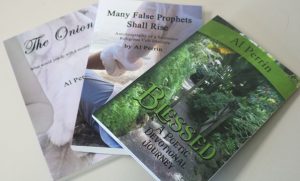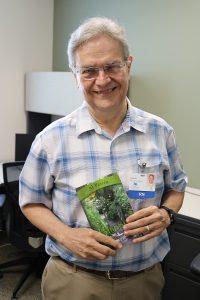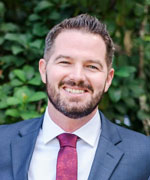Al Perrin: A Survivor of Spiritual Distress
When I first sat down to talk to LifePath Hospice nurse Al Perrin, I figured our conversation would be relatively straightforward. I had put out a call to find nurses at Chapters Health System who had a unique or interesting hobby. Maybe a fun side job? The goal was to talk about what it’s like to try to find a work-life balance as a hospice nurse. It can at times be a hard, often accompanied by physical, emotional, and spiritual distress, so I figured some of our nurses had to be experts in work-life balance.
I had heard from another colleague that Al was a published author, which seemed like a perfect subject to me. If he could find enough time outside of work to do all of this writing, Al probably had a pretty good handle on work-life balance.
We covered a few of the basics right off the bat. Al told me he grew up in Ada, Michigan, just outside of Grand Rapids. He has three brothers: two older, one younger, and a sister who is also a nurse. Al told me his mother was an artist and liked to write, which he said rubbed off on him at a young age.
“I’ve always been writing,” Al said. “Ever since I was a kid. It’s just something I’ve always liked doing.”
As for his 38-year career in healthcare, that began with a stint as an orderly in a nursing home. After meeting his eventual wife, who worked as a nurse’s aide, he earned a degree from the Grand Rapids Community College School of Nursing.
“Helping people is something I seemed to be good at,” Al said.
Avoidance of Spiritual Distress
After a few minutes, we got to what was supposed to be the main subject of this blog.
Al and I did talk about work-life balance. He shared his method is to compartmentalize it.
“When I’m at home, I’m at home,” Al said. “When I’m at work, I’m at work. There are times when you’ve had a real busy day, you just have to do something else for a while and relax. Writing helps do that for me.”
Al said he tries to write something every day to help keep him focused and his writing consistent. I asked him if any of his book characters were ever based on any of his former hospice patients. He was quick to shoot the idea down.
“That’s their lives,” he said. “That’s their privacy. We’re entering their home and they have to trust you. If you lose that trust, then you lose any sort of care you can do for them.”
One of Al’s books is a book of poems called “Blessed: A Poetic Devotional Journey.”
It recently won a silver medal at the Florida Authors and Publishers Association Awards. It also features photos he took, so you can also add photographer to his resume.
And in case all of that wasn’t impressive enough, Al also has a pilot’s license, even avoiding a tailspin crash at 2,500-feet thanks to some quick thinking and recalling a maneuver he read about when he was 10 years old.
Surviving “The Movement”
 At this point in our conversation I’m thinking to myself, “Wow what hasn’t this guy done?”
At this point in our conversation I’m thinking to myself, “Wow what hasn’t this guy done?”
Then, about 20-minutes in, he casually mentioned something. Like it was just another minor detail of his life. We had covered his nursing career. His writing career. His photography. His near-plane crash. What else was he going to throw on top of all of that?
“And when I was 16, I joined a religious cult.”
He kept talking, but I did a double take. I had to cut him off and ask him just to make sure what I heard was correct, “You were in a cult?”
“Absolutely,” he said. “One of the worst ones you’ve never heard of.”
That’s when he hands me a copy of his book, “Many False Prophets Shall Rise.”
This wasn’t fiction. It wasn’t poems.
“Autobiography of a Seventies Religious Cult Disciple.”
Right there below the title.
I was at a loss. At this point I was scrambling to come up with a whole new set of questions on the fly. The last thing I thought I was going to be talking about that day was how someone got into and out of a religious cult.
“I was the only person who even knew the cult leaders real name,” Al said. “Everyone thought he was the reincarnation of Elijah the Prophet. Don could sell ketchup popsicles to an Eskimo wearing white gloves.”
Al said he started writing the book shortly after he was kicked out of the group called “The Movement.”
The book reads like a suspense novel. It begins at what he said was supposed to be a church group camping trip, but quickly turned into something more like a boot camp. Before long Al and the other group members found themselves navigating the sewers under Grand Rapids, or blindfolded and being led through the woods.
Al described how he got wrapped up in the group in the first place. A shy teenager still trying to find his way in the social world, suddenly met an accepting group of people at what he thought was a church group. “The whole place was alive with excitement,” he wrote. “There was an air of anticipation and exhilaration.”
While I was reading it, I felt like I was watching a horror movie unfold, wanting to yell “don’t go in there!” at the screen.
During our conversation about his time in the cult, I noticed Al kept saying he “got out,” which made me think about others who may not have been so lucky. I asked him if he considered himself a survivor.
“Survivor is a very appropriate term,” later admitting that some members did ultimately take their own lives.
Al said he himself was suicidal near the end of his time with “The Movement”, but credited another former member with saving his life.
Caring for Hospice Patients in Spiritual Distress
Oddly enough, Al’s time in “The Movement” lends a unique perspective to his interactions with hospice patients.
“For our patients who are in spiritual distress,” Al said. “I know what that is. I refer them to our chaplains, but I can be a listening ear.”
I asked Al if his time in the cult made it hard to return to traditional religion after all he had been through.
“I never left Christianity,” he said. “I left Don.”
At Chapters Health System and its affiliates—Good Shepherd Hospice, HPH Hospice and LifePath Hospice, every day is devoted to educating our patients and keeping them in the place they call home. We are dedicated to ensuring that patients, young and old alike, and their families are able to make educated decisions about important healthcare matters. For more information, please call our helpful Chapters Health team at 1.866.204.8611 or send an email to info@chaptershealth.org.
Pat Carragher, Media Relations Coordinator for Chapters Health System, coordinates external communications for the not-for-profit organization.
Spiritual Rx
By Father Christian Villagomeza, BTh, MDiv, BCC, LifePath Hospice, Chaplain
Spiritual Symptoms of Chronic Pain
“Why is this happening to me?” is one of the many questions that a person with chronic pain often asks.
People with chronic pain often struggle with the meaning of their disease and the changes it makes to
their relationship with themselves, others and the divine. The moment they are no longer able to work
or engage in any activity, questions and distress can arise regarding what meaning and purpose their
lives now have and how to adapt to those changes. They may struggle with a sense of betrayal from
their bodies, beliefs and values, and even more so if their medical needs aren’t addressed effectively.
The sense of self-worth for patients with chronic pain is often challenged. They question their:
• Ability to make decisions.
• Relationships, which can change, become strained or break due to their symptoms and
limitations.
• Inability to participate in community activities, both social and religious, that have been a
source of connectedness and support religious.
Anger, sadness and feelings of abandonment commonly arise. Likewise, depression can be
overlooked by healthcare providers or treated simply with medication rather than identifying and
addressing the underlying emotional and spiritual distress almost invisible on the surface.
It is critically important we understand each of these issues and their relationship to one another.
